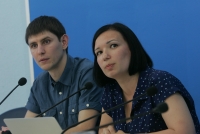Administrative Resource – a Threat to Honest Elections

During their presentation of the civic movement OPORA Third Monthly Monitoring Report, cases of abuse of administrative resources were highlighted. These include involvement of public sector employees in pre-election events and the use by officials of official pretexts for campaigning purposes.
Oleksandr Neberykut:
“Over the last three months both OPORA monitors and the independent media have noted dangerous tendencies suggesting a real threat that administrative resources are being used by certain potential electoral players in order to artificially reduce the level of political competition in the country. This could lead to flagrant infringements of one of the guiding European principles of electoral law – ensuring equal opportunities for all parties and candidates, and cast doubts regarding how fair the elections were in the eyes of the Ukrainian public and international community”.
Combining party and official activities is in breach of Article 4 of the Law on Political Parties. Public officials are also urged to refrain from demonstrating their political views in the Order from the Central Civil Service Department No. 241 from 4 August 2010.
A tendency seen in the parliamentary campaign is the attempt by certain political forces and potential candidates to involve public sector employers in campaigning events.
OPORA mentions the initiatives from central and local authorities to hire new temporary staff in the social services. The official grounds for expansion and increase in funding for these services Is the need to improve measures aimed at implementing the so-called “social initiatives” of the President and government.
Deputy Prime Minister Serhiy Tihipko has said that throughout the country 12, 000 temporary social workers will be trained. Each will received around 1thousand UAH more pay than others in analogous positions in the social services. Most such jobs will be created in the Poltava region (908), the least in Sevastopol (15).
This decision has provoked fierce political conflict since it carries objective risks that the temporary staff will be involved in campaigning for pro-regime candidates.
The Ternopil Regional Council, for example, refused to support the redistribution of 12 million UAH of state subsidies for the creation of 400 temporary jobs. The council’s deputies decided to check the grounds for creating new jobs and proposed introducing the project after the elections.
In the Sumy region OPORA observers recorded a case where during a visit to a 93-year-old pensioner, the social worker tried to find out the lady’s political preferences. The social worker also told her that if she supported the government she would receive a free device for digital television.
In the Volyn region local residents have approached OPORA over the “voluntary – compulsory” nature of public sector workers’ involvement in the electoral campaign of one of the candidates.
The electoral team of local benefactor and MP Ihor Palytsa with the help of school heads has been involving teachers in election campaigning.
OPORA Electoral Programme Coordinator Olha Aivazovska pointed out that potential candidates, especially current MPs are positioning themselves as lobbyists for the interests of particular electoral constituencies with respect to obtaining resources from the State budget. She says that a certain example and precedent in this has been created by the parliamentary leadership. Speaker Volodymyr Lytvyn (Narodna Partia) and his First Deputy Adam Martynyuk (Communist Party) both actively use their official status when working in electoral districts.
For example, Martynyuk asserts that he “successfully lobbied for” allocation by the Cabinet of Ministers of 10.8 million UAH for socio-economic needs of the Kamin-Kashyrsk and Kivertsivsk districts of the Volyn region. Such pre-election strategy by the parliamentary leadership promotes uncontrolled use of budgetary administrative resources by other parliamentarians and officials.
Olha Aivazovska noted that members of VO Svoboda holding high posts in western regions of the country are also abusing official position for their own campaigning interests.
For example the formal agreement by the head of the Lviv Regional Council Oleh Pankivych for unscheduled repairs to a damaged road is presented as being the result of his political party’s activities.
Potential candidates are using professional holidays (medical workers’ day, journalist day etc – translator) to make themselves known to the electorate, with lavish gifts being presented.
OPORA has noted many addresses made by public officials which directly indicate their sympathies or prejudices regarding specific political parties. Such demonstrative infringement by public officials of officially affirmed standards places in question the chances of equal conditions for the activities of all political parties.
On 4 July the Verkhovna Rada voted to allocate almost 100 million UAH on installing CCTV cameras at polling booths. OPORA suggests that it would be more sensible to install CCTV not only in the rooms where District Electoral Commissions meet, but in the adjoining corridors making it possible to recording infringements (stamps from the precinct electoral commissions, empty protocol papers, readjustment of the figures). It is also important to introduce audio and video recordings of each protocol being read out and record the transcripts of important meetings of the District Electoral Commissions.
Slightly abridged from the report here http://opora.org.ua/news/1544-administratyvnyj-resurs-zagroza-chesnym-vyboram





